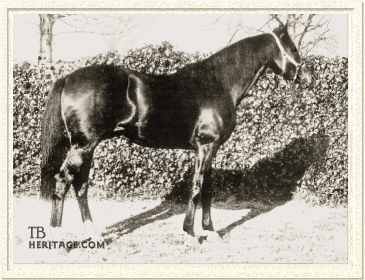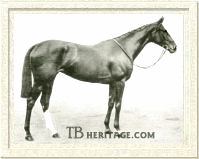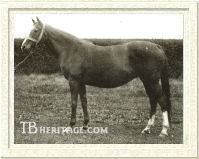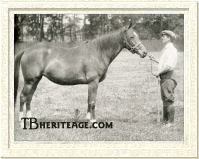|
|
Americus

|
|
 |
|
|
Americus was bred by Lucky Baldwin and foaled at Rancho Santa Anita in 1892. He was foaled from Clara D., by Glenelg, a mare purchased from breeder Milton Sanford of the Preakness Stud in Kentucky. Clara D.'s dam was The Nun, a full sister to Norfolk, meaning that Americus was intensely inbred -- 2x2 to the full siblings Norfolk and The Nun, and 3x3 to their parents Lexington and Novice. The intent was to name Clara D.'s colt Rey del Carreres ("king of runners"), but a clerical error resulted in him racing as "Rey del Carredes" until Baldwin managed to correct it officially in 1895.
Americus on the Turf
Racing for Baldwin, Rey del Carreres/Carredes won 3 races at 2 and ran second by a head in the World's Fair Stakes. As a 3-year-old, he proved to be one of the great speed horses of his day, winning 10 races, many under high weight imposts. The high point of his American career came in early October of that 3-year-old year, in the 6-furlong Culver Handicap at Sheepshead Bay in which he carried 135 pounds to victory in a common gallop. He had previously disposed of that year's Preakness and Belmont Stakes winner Belmar in the Brookwood Handicap, and had placed on more than one occasion behind the year-older speed god Domino. In his final start of the year, Rey del Carreres was second in the Billow Stakes by a neck, giving 35 pounds to the winner. This record placed his reputation among the best of the 3-year-olds that season, behind division leaders Keenan and Belmar. He had won $14,865 and 13 races at 2 and 3.
Baldwin was offered $30,000 from Mike Dwyer for the colt, but he refused it. His price, it seems, was $40,000, which he accepted from Richard "Boss" Croker a few weeks following the Culver Handicap victory.
At the end of October, Croker sent his latest acquisition to England along with Dobbins, Santa Anita, and Rhoda B., to prepare for racing there in 1896. In a burst of patriotism, Croker renamed his colt "Americus," under which name he raced in England and Ireland.
Americus started twice as a 4-year-old in England and was unsuccessful on both attempts, but managed a second place in the Portland Plate (at Doncaster) to Grig in a tight finish. At 5, he started 13 times, winning twice, the Riddlesdown Plate (Epsom) and Southdown Plate (Brighton), and ran second in the Stewards' Cup (Goodwood ) to Ugly, and in the De Warrenne Handicap (Lewes).
He stood the 1898 and 1899 seasons at Croker's Glencairn Stud, near Leopardstown in Ireland where he covered only a few mares both years. Not paying his way as a stallion and apparently still racing sound, Americus was put back in training, and he returned to the races at 8, starting 4 more times. He won at Gatwick over 5 furlongs, was second in the Pegasus Cup at Cork, and ran a good fourth in the Stewards' Cup. He raced again at 9 (1891), 7 starts, third at Lingfield, and in prestigious July Cup at Newmarket.
According to Ulbrich "at an event at Goodwood, he was opposed by one of his sons!" Americus was retired yet again, chalking up an additional 31 starts in England and Ireland, with 4 wins and $6,496.
Americus in the Stud
Americus maintained an extremely uneventful life as a stallion, primarily since his stud fee, much too much for a horse of his ilk, resulted in him being underpatronized.
In 1904 he covered Mr. Ledlie's only mare, Palotta, a daughter of Gallinule. In the fall of 1905, Americus was sent to Italy on a 2-year lease that kept him in Mediterranean climes for the 1906 and 1907 breeding seasons. In 1907, his strapping 2-year-old filly Americus Girl (1905), the daughter of Americus and Palotta, began racing in Ireland, winning 5 of 6 starts including the Phoenix Plate.
Americus returned to Glencairn Stud in triumph for the 1908 season and Mr. Ledlie was waiting for him again with Palotta. She produced another filly by Americus in 1909 which was named Lady Americus.
At 3, Americus Girl won the Fern Hill Stakes at Ascot, and the next year, 1909, won the Portland Handicap carrying highweight. At 5, she won the Great Surrey Handicap, and ended her career of dynamic sprinting by dropping just a head second to Spanish Prince in the King's Stand Stakes. She retired with 12 wins in 29 starts over 4 seasons. In 1911, her younger sister, Lady Americus, came to the races and won the Coventry Stakes at Royal Ascot as a 2-year-old.
Breeders now looking for the services of Americus were disappointed to learn that he had been sold to German interests and had stood the 1909 and 1910 seasons at the Hoppegarten Stud at Trakehnen. Even worse, he was reported to have died there in 1910. His record shows 38 winners, 7 of which won stakes, including the sisters Americus Girl and Lady Americus, Gladwin, Jack Snipe, Rath Hurley, Americus Boy, and Benanet.
From this small accounting, the legacy left by Americus is remarkable. Americus Girl produced the filly Lady Josephine (by Sundridge), winner of the Coventry Stakes, and from whom descends a hugely influential branch of the 9-c family. Lady Josephine's daughter, the stakes winning stayer Lady Juror, produced Fair Trial, Riot, and Sansonnet, and is the ancestress of *Tudor Minstrel, Abernant, Commotion, and Aristophanes. (The great Argentine horse *Forli was inbred 4x4 to Lady Juror.)
|

Americus Girl

Her influential daughter, Lady Josephine

Lady Americus, sister to Americus Girl and stakes winner and producer in her own right
| |
Lady Josephine also produced Mumtaz Mahal, known as "The Flying Filly" for her feats of wonder on the track. As a broodmare, Mumtaz Mahal became the dam of Mirza and Furrokh Siyar, and the ancestress of *Mahmoud, Badruddin, *Nasrullah, *Royal Charger, *Prince Taj, *Migoli, Petite Etoile, Kalamoun, Habibti, Eight Carat, Octagonal, and Shergar, to name a few of the best.
Americus Girl's sister, Lady Americus, produced Dollar Princess (by Hapsburg), herself granddam of the 2-year-old stakes winners Belle Travers and Maltravers, both by Mr. Jinks. Group winners Gift Wrapped and her good son Reach descend from Belle Travers in female line.
Americus Girl and Lady Americus were both out of the mare Palotta.
Without the collaboration of Palotta, Americus sired another significant broodmare in Mrs. K. (1906 out of Wise Letter by Wiseman), who produced *Shyness, dam of American-bred Slow and Easy. The latter was one of the few offspring sired by the infertile Colin, and she was the dam of stakes winners Easy Mon, *Crossbow II, Gosum, and Broodmare of the Year Easy Lass (Kentucky's Broodmare of the Year in 1949 when dam of Calumet's champions Coaltown and Wistful).
Americus' daughter, Caspia (1906 out of Halma by Boulevard), produced Glaspia and Fairy View. Glaspia (by Glasgerion) was the dam of the cup horse, Grand Glacier, whose daughter Anyway was the dam of Solonaway and Lady Kells. Fairy View (by Fariman) was the dam of Irish 1,000 Guineas winner Glenshesk.
Croker himself bred Yankee, a 1905 filly by Americus out of Little Blanche by Gallinule (so three-quarters related to Americus Lady, whose dam was Palotta, another daughter of Gallinule). He sent Yankee to his homebred Derby winner Orby and got *Glencairn, who returned to America to sire the stakes winner Anna Marrone II.
A son of Americus named Golden Rod (1906 out of Flower of Song by St. Florian) sired 1917 Irish Oaks winner Golden Maid.
|
The success of Croker's American-bred horses such as Americus and Rhoda B. (dam of Derby winner Orby and 1,000 Guineas winner Rhodora) was one of the reasons behind the introduction of the infamous Jersey Act of 1913. It barred any further American-breds from recognition in the General Stud Bookunless their pedigrees could be traced flawlessly to animals already appearing therein. Unfortunately, this was a problem for most American-breds, since the backgrounds of both Lexington and Hanover, two of the most important American sires, were both tainted with "impurity" by this definition. While these lines also appeared in the pedigrees of Americus and Rhoda B. (and in American-bred Sibola, the third dam of Nearco), these had been accepted for entry in the GSB before 1913 and so had not faced the indignity of being officially declared "half-bred."
Ironically, it was partly due to the remarkable records compiled by the descendants of Americus, including *Mahmoud (Derby winner of 1936), *Tudor Minstrel (2,000 Guineas winner of 1947), *Nasrullah, and Abernant, that led to the repeal of the Jersey Act in 1949.
--Anne Peters |
|
|
|

